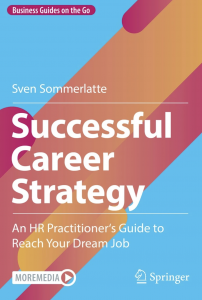This article outlines the 3 steps to define my career strategy – Many of us spend a lot of time on the business strategy but rarely much time on defining our personal career strategy. Here are some tips how to improve this.
Have you defined your career strategy?
How much time have you spent over the past 12 months to think about your career strategy? And how much time have you dedicated to the strategy of the business that you work for or that you are in charge of? Many of us you have probably spent a lot of time defining the business strategy and quite little time on our individual career strategy.
One of the reasons is that we don’t really know what approach to take to define and review our career strategy. I would therefore like to make a proposal here. You will see that it is very similar to a typical strategy methodology that we use.
Assess your experience base
The starting point is to assess your experience base. Your experience base may include operational leadership responsibilities, it may include functional responsibilities you have had in the past, in could include exposure you had to different industry sectors or international experience you have gained from working abroad or from a multi-country responsibility.
All of this is forming your experience base. I would recommend conducting that inventory of experience you have been able to collect during your career so far. You should be mindful of the fact that the boarder the experience base, the higher the career the career progression is likely to be. That is very similar to the Egyptian pyramids: the broader the base, the higher they are. That is the starting point. You fill find on my webpage a specific article and video on that topic of the experience base (link: Assess your experience base).

Define the vision for your career
The second step is to define the vision for your career. That should help defining where you ultimately want to go in your career. This sounds basic but it is not. First of all, it is not so frequent that people manage to project themselves really 10+ years ahead in view of the job they want to have. But even more importantly, people don’t connect that always to the specific life that represents and if it really corresponds to their desire.

The following questions can help specify this vision.
1) Type of job
- Do I want to have the responsibility for sizable teams or do I rather want to work on my own?
- Do I prefer to work in a large organization or be more independent ?
- Do I want to have a job where the creative dimension is important?
2) Life style
- In which country do I want to live?
- Am I mobile?
- Do I want to spend a lot of time travelling?
- What level of stress am I prepared to put up with?
3) Personal and professional development
- What skills do I want to gain or to further develop? How that relate to the longer term perspective I have for my career development?
- What kind of leadership experiences do I want to gain form my job?
All of these very concrete questions should be clarified in order to have a very clear and specific understanding of the career progression that I aspire to and of the future position that corresponds truly to my vision. The answers to those questions are driven by what I call the deep desire. You may check out my article and video on this topic as well (link: Connect to your deep desire)

Assess your experience and competence gap
Once you have defined your current experience base and the vision of where you want to be in the future, you can assess the experience and competence gap. That is the gap between our experience base today and the experience that will be required to be selected to the position you wish to achieve. The more specific that is done, the better it is. You can use for example the job description of that future position. It is usually not so difficult to obtain it. You may get it from HR or for a person who holds that position today or if that is not possible, you may find it online.

Be very specific in defining this competence and experience gap. The better you can describe this gap, the easier it will be to define concrete actions to fill in in a structured approach. The next and the following career step should be defined in a very carefully in order to best respond to those requirements. Training and project assignments may be used to gain additional experience in view of being best prepared to achieving your career ambition.
Once you have defined your career strategy by following these 3 steps, you should review it on a regular basis as outlined in my article on that topic (Link: Your are the CEO of your little enterprise). I wish you every success in your career development.
More information in my book:
Sven Sommerlatte : Successful Career Strategy – An HR Practitioner’s Guide to Reach Your Dream Job (Springer, June 2023). ISBN: 978-3-662-66790-3
